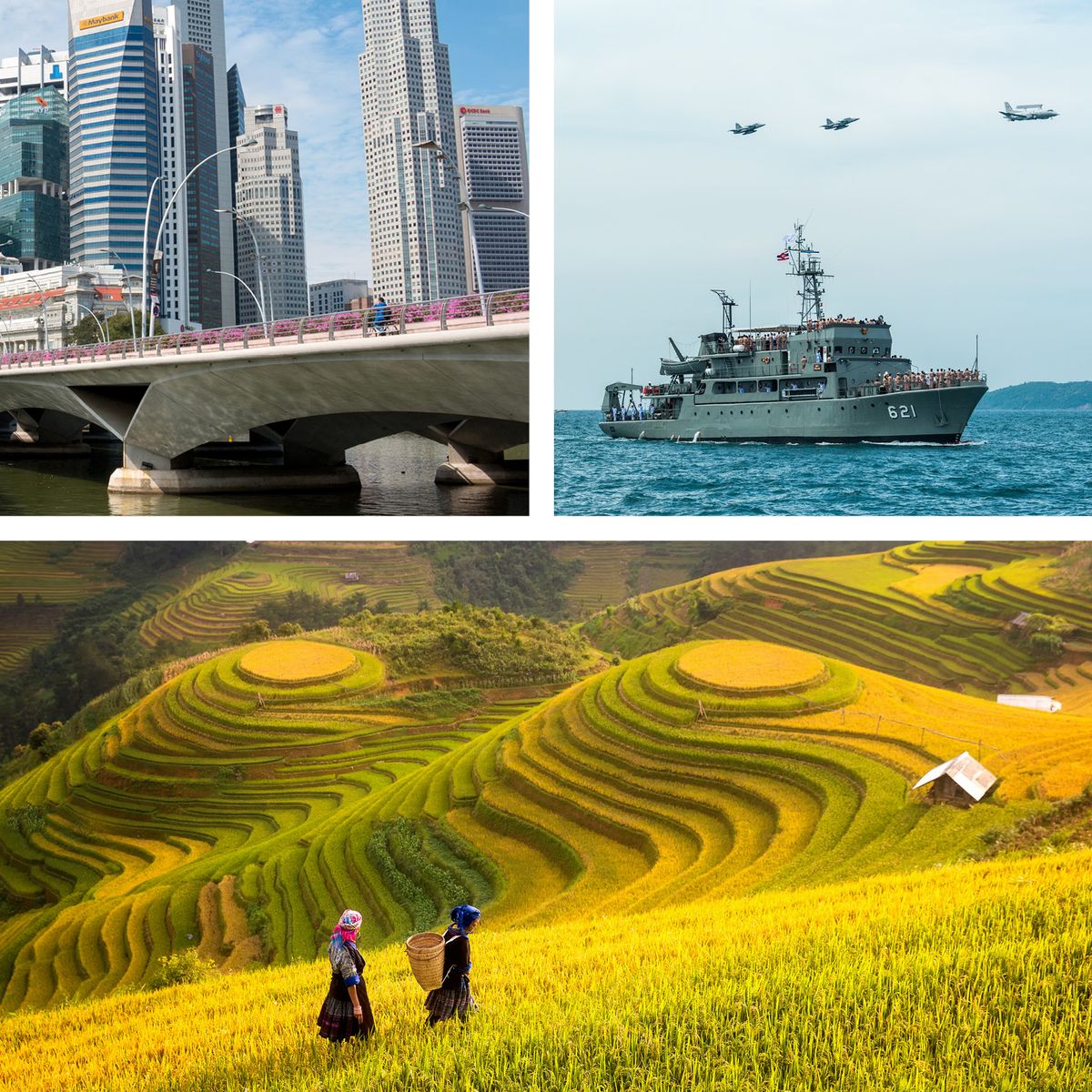
Summary
The Association of Southeast Asian Nations (ASEAN) and the European Union are looking for concrete ways to expand their cooperation in areas ranging from security to cyberspace norms, panellists told a Friends of Europe debate on 27 February.
Held as part of the EU-ASEAN Strategic Thinkers Forum, the conference ‘EU-ASEAN relations: the next forty years’ focussed on how to enhance relations between two regional groupings that share many common values – such as a belief in a rules-based international order – but are very different in structure: The EU is based on law, while ASEAN is an intergovernmental organisation.
An ASEAN-EU Plan of Action for 2018 to 2022 takes the relationship further, going into areas such as counter-terrorism, innovation, transport, trade facilitation, gender equality, environmental protection and sustainable development. “It is more ambitious in a much more challenging environment,” said Le Luong Minh, who was Secretary General of ASEAN from 2013 to 2017. “We are convinced of the importance of collective resilience through local integration and consensus on developments.” He said the relationship was particularly important given the current big-power rivalries in the world.
The relationship should avoid too much focus on institutional concerns, such as the EU’s place at the East Asia Summit, said Reinhard Bütikofer, Member of European Parliament and rapporteur on EU-ASEAN relations. “The core content of this relationship is whether we can be useful for each other,” he said. “One issue that we should invest in from both sides is connectivity. Connectivity is connecting people – not just investment or roads or economic factors: connecting people and connecting ideas. In that sense all our ideas and ambitions come into play.”
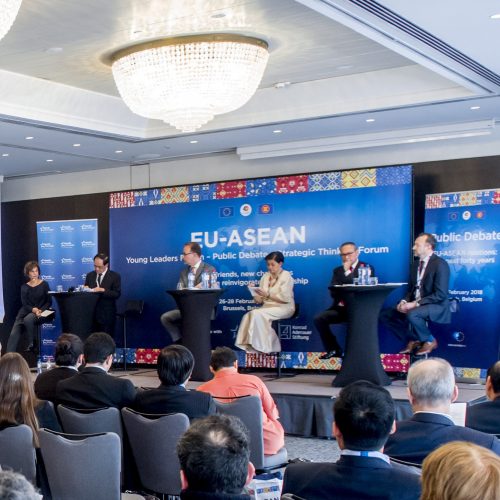
Event recording
EU-ASEAN relations: The next forty years — SESSION I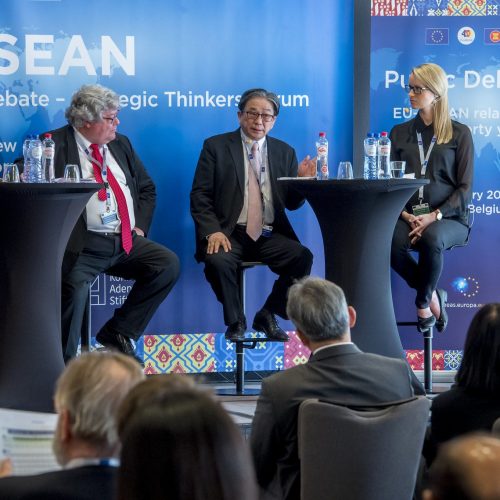
Event recording
EU-ASEAN relations: The next forty years — SESSION IIAbout
ASEAN and the EU have a strong partnership, which celebrated its 40th anniversary in 2017. Held alongside the EU-ASEAN Strategic Thinkers Forum, this debate will be an opportunity for participants to reflect on the status of official relations over the years and to identify ways in which those relations can be bolstered going forward.
The debate will take place in two sessions. The first session will draw on the two blocs’ experiences in responding to unexpected geopolitical transformations and uncertainties, allowing for an exchange of lessons learned, while the second session will dive into the future of EU-ASEAN relations.
Related content:
- As Trump embarks on Asia trip, it’s Europe that is really pivoting to Asia by Shada Islam, Director for Europe and Geopolitics at Friends of Europe
- Will troubled waters spoil ASEAN’s celebrations? by Yeo Lay Hwee
Schedule
ASEAN and the European Union are adjusting and adapting to unexpected geopolitical transformations and uncertainties. Having just celebrated its golden jubilee, ASEAN is entering a critical new chapter in its quest for greater regional cooperation and integration amid expectations it will play a bigger and more relevant role in global affairs. The EU has reaffirmed its unity, ambition and resolve in the face of Brexit as well as rising pressure from populists and difficult neighbours. ASEAN’s main challenge in the coming years will be to move towards a truly integrated economic community while also navigating the difficult US-China relationship and maintaining “ASEAN centrality” in the face of external pressures. Europe is charting a new course for its relations with its neighbourhood including Russia, Turkey and Africa as well as with China and has taken important steps in building a defence and security identity. Both ASEAN and the EU are dealing with immigration and refugees and have a shared interest in the preservation of the rules-based international order and developing new norms for cyberspace and tackling hybrid security threats.
- What are ASEAN and Europe’s key economic and security interests and concerns in a changing regional and global environment?
- Can ASEAN and the EU join ranks more forcefully on tackling global challenges including climate change, sustainable development and terrorism?
- Are there key lessons that ASEAN and the EU share with each other on how to live and thrive in a changing world?
- How are young people in ASEAN and the EU reacting to the rapid global transformations and how is this impacting on regional politics?
Keynote speaker
Lê Lương Minh
Secretary-General of the Association of Southeast Asian Nations (2013-2017)
Speakers
Clarita Carlos
Professor of Political Science at the University of the Philippines
Bart Gaens
Senior Research Fellow at the Finnish Institute of International Affairs
Lê Lương Minh
Secretary-General of the Association of Southeast Asian Nations (2013-2017)
Peter Potman
Director of the Asia and Oceania Department at the Dutch Ministry of Foreign Affairs
Jose Tavares
Director General of ASEAN Cooperation at the Ministry of Foreign Affairs, Indonesia
Moderator
Shada Islam
Managing Director at New Horizons Project
ASEAN-EU relations have grown and evolved steadily over the years, with both sides inter-acting on a range of economic, political and social issues. Meeting in Manila last August, ASEAN and EU ministers crafted an extensive and multi-faceted plan of action for a further upgrade of cooperation with a focus on bilateral ties, including security issues and connectivity, as well as on the wider global agenda including climate change, counter-terrorism and sustainable development. Ministers and the European Parliament have come out in favour of a resumption of negotiation on an EU-ASEAN free trade agreement. Contacts between ministers, policymakers, business leaders and civil society representatives are increasing. It hasn’t always been plain-sailing, however. Differences over human rights and the application of EU standards in sectors such as palm oil and fisheries as well as the EU’s long-standing quest to become a permanent member of the East Asia Summit continue to cast a shadow over relations.
- ASEAN-EU relations have shown a remarkable degree of resilience so far but will the relationship survive – and if it does will it still matter in forty years?
- In a volatile world, what can the ASEAN and EU do better and/or differently to reinforce relations in the coming years?
- Given their differences on key issues like human rights, can the EU and ASEAN forge a true strategic partnership and negotiate a free trade agreement?
- What can be done to promote greater people-to-people contacts – especially among young people – in ASEAN and Europe?
Speakers
Reinhard Bütikofer
Member of the European Parliament and Rapporteur on EU-ASEAN relations
Yeo Lay Hwee
Director of Nanyang Technological University’s European Union Centre
Dr. Suthad Setboonsarng
Member of the Board of the Bank of Thailand and Banpu Plc
Annika Siirak
PhD Candidate at the University of Tartu and EU-ASEAN Young Leader
Moderator
Shada Islam
Managing Director at New Horizons Project
Speakers
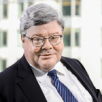
Member of the European Parliament and Rapporteur on EU-ASEAN relations
As rapporteur of the latest European Parliament report on EU political relations with ASEAN, as well as a part of the European Parliament delegation for relations with the countries of Southeast Asia and ASEAN, Reinhard Bütikofer has a deep understanding and expertise of the region. Bütikofer travels frequently to Southeast Asia, not only to promote stronger ties with the European Union but also to support and bolster trade and investment. Bütikofer is a strong advocate for peace within the region, including for the resolution of disputes in the South China Sea.
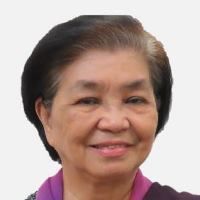
Professor of Political Science at the University of the Philippines
Clarita Carlos was the first female, civilian President of the National Defense College of the Philippines and has written prolifically on a wide range of themes including political parties, elections, bureaucratic reform and democratic deficits. Today she heads the Center for Political and Democratic Reform and is a recognised pioneer in Political Psychology in the Philippines. Carlos continues to teach and to offer her expertise as a consultant to Congress and other government agencies, as well as academic institutions.

Senior Research Fellow at the Finnish Institute of International Affairs
Bart Gaens is an experienced academic whose research has focussed on major power relations in East Asia, EU-Asia relations, and the Asia-Europe Meeting (ASEM). He previously led a research project on the EU’s relations with Asia at the University of Helsinki Network for European Studies and worked as an advisor in the Finnish Ministry for Foreign Affairs during preparations for the ASEM6 Summit. He has published extensively on Europe-Asia interregional relations, with special focus on the ASEM process.
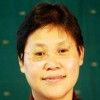
Director of Nanyang Technological University’s European Union Centre
An international relations expert, Yeo Lay Hwee’s research interests revolve around comparative regionalism, multilateralism and governance networks. She has written extensively on issues pertaining to Asia-Europe relations in general, and specifically on the ASEM process and EU-ASEAN relations. In addition to leading the European Union Centre, she is also Council Secretary at the Singapore Institute of International Affairs, Adjunct Fellow at the S Rajaratnam School of International Studies, and Adjunct Faculty at the Singapore Management University. Yeo is also a member of the Scientific Committee of a multi-year research project on ‘Trends in Global Governance and Europe’s Role’.
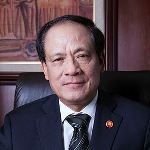
Secretary-General of the Association of Southeast Asian Nations (2013-2017)
Before assuming his post as ASEAN Secretary-General, Lê Lương Minh was Vietnam’s Deputy Minister for Foreign Affairs. In addition to that he was also Vietnam’s Ambassador Extraordinary and Plenipotentiary and Permanent Representative to the United Nations. A number of ASEAN scholars believe he has been instrumental in fomenting a more forceful Secretariat and strengthening the regional bloc’s institutions. He also led the drive for the EU to open a permanent mission in ASEAN and recently agreed the ASEAN-US Plan of Action 2016–2020.

Director of the Asia and Oceania Department at the Dutch Ministry of Foreign Affairs
During his time at the Asia and Oceania Department Peter Potman has focussed on enhancing interaction with stakeholders in the foreign policy of the Netherlands. During his tenure, the Department developed the “Asia Carrousel” as a domestic outreach programme, which aims to enhance knowledge and contacts between the Netherlands and the region. The Carrousel brings staff from the Ministry of Foreign Affairs together with various partners, including from academia, civil society, the private sector, the media and other government agencies. Embassies of Asian countries in The Hague and Dutch embassies in Asia and Oceania also participate in Carrousel events.
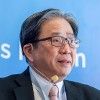
Member of the Board of the Bank of Thailand and Banpu Plc
Suthad Setboonsarng is one of Southeast Asia’s top experts in international trade and investment, and has led Thai, ASEAN and private sector initiatives. As Thailand Trade Representative in the Office of the Prime Minister, a ministerial rank appointment, he coordinated and executed international trade, investment and other related assignments. Formerly a partner at PriceWaterhouseCoopers, Setboonsarng assisted Fortune 500 companies in their business operations in ASEAN and advised the Thai and ASEAN governments and the United Nations in developing their regional trade and investment policies.
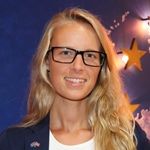
PhD Candidate at the University of Tartu and EU-ASEAN Young Leader
Annika Siirak is currently a PhD Candidate at the University of Tartu and a visiting lecturer on the European Union at the Tallinn University of Technology, Estonia, focusing her research on the EU’s democracy promotion and regime transition. She previously was a Junior Professional at the Mission of the European Union to ASEAN in Jakarta, coordinating EU-ASEAN political relations, development cooperation and public diplomacy activities, in relation to celebrating the 40th anniversary of their dialogue relations in 2017.
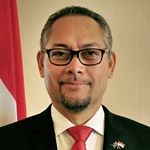
Director General of ASEAN Cooperation at the Ministry of Foreign Affairs, Indonesia
With more than 30 years’ experience in the Indonesian Ministry of Foreign Affairs, Jose Tavares was appointed Director General of ASEAN Cooperation in May 2016. He has previously held several high-level positions in the ministry promoting closer ASEAN cooperation, serving as Director for Dialogue Partners and Inter-Regional Affairs of ASEAN and Director for ASEAN Political and Security Cooperation. His diplomatic career also includes postings in New Zealand, Samoa and Tonga – serving as Ambassador-, Belgium, France and Switzerland.
Partners
Coorganized with
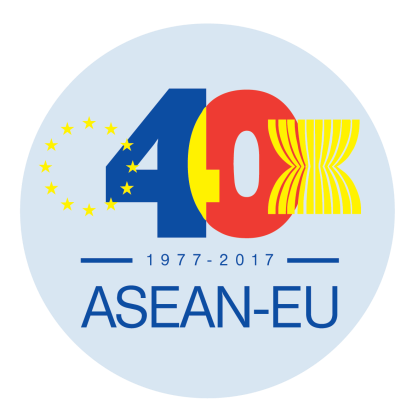


Activities
Europe-China Forum
Next event In person & livestreamed

- Area of Expertise
- Global Europe
Trading tariffs and trade as a geopolitical tool
Past event

- Area of Expertise
- Global Europe
From aid to investment: shaping Europe's global role in a changing world
Past event Online

- Area of Expertise
- Global Europe
Future Africa-Europe High-Level Forum
Past event IN PERSON & ONLINE

- Area of Expertise
- Global Europe
DRIVE Impact Initiative final report
- Category
- Event Reports
- Area of Expertise
- Global Europe
Europe’s blackouts call for a NATO-level response
- Category
- #CriticalThinking
- Author
- By Maurizio Geri
Trump's axing of US aid hands the EU a global leadership role
- Category
- Frankly Speaking
- Author
- By Giles Merritt
The digital battlefield: EU-China cybersecurity diplomacy in the 21st…
- Category
- #CriticalThinking
- Author
- By Dr Cristina Vanberghen

- Area of Expertise
- Global Europe

- Area of Expertise
- Global Europe

- Area of Expertise
- Democracy
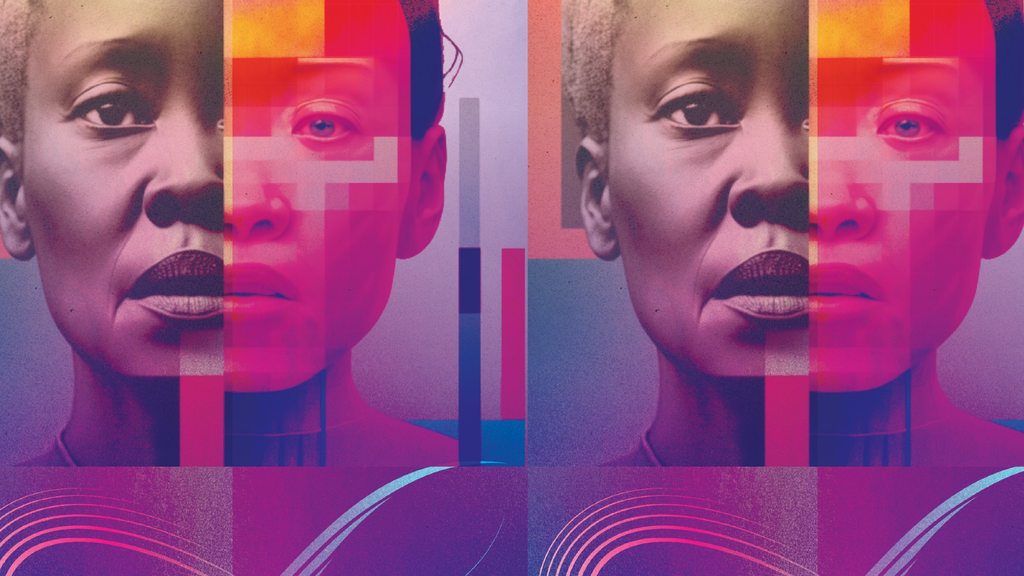
- Area of Expertise
- Global Europe
Continue
the debate on
- Debating Europe

